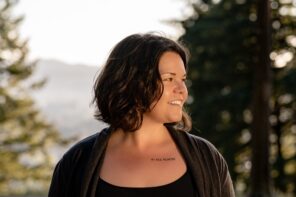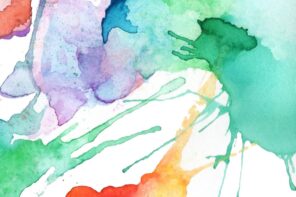Curses linger, so Kalki moves.
Movement traces the long edges of her memory, a personal rain cloud hovering over her, reminding her that it is part of her inheritance. The moving started with her mother, grandmother, and great-meemaw. They cradled each other across state lines before Kalki was born, stuffed into their Mazda like skinny little anchovies. The curse hovered over their car the entire trip and pulled right up with them to the front door of their new home. The Khalsa curse. Kalki’s been moving for a while now because there must be a limit on what their curse will take, how far it will trail after her. So far, she hasn’t found it. Even when it seems to be gone, it remains in the periphery, out of focus, patiently waiting to unblur.
Kalki’s heart clumps.
It happens when she thinks of her mother, grandmother, and great-meemaw racing down the freeway. Sometimes the scene plays to her like a memory, though it is more of a haunting, since she wasn’t born yet. Her mother was pregnant with her, but she didn’t know it then. Her mother is like that, loose with her facts. As a child Kalki would say, I’m a strainer, mama. I’ll pick out all the bad stuff and send you back the good. Her mother’s lips would stay tight, and eventually, the quiet was enough to stop Kalki from asking questions about that trip, at least out loud. Still, this trilling in the back of her mind. Kalki knows there are things she doesn’t know. Like, was her great-meemaw’s back good enough then to drive, or was she reclined up front the whole way? Where did the three of them get all that money for gas? Did they leave her father, or had he left them?
Kalki can’t believe it.
Today is different because of a Facebook message from a man whose profile photo is of turtles in a garden. The turtles sent a dramatic introductory message: I am your father. Kalki reads the message twice, her body pulsing. She thinks through scenarios her curse could land her in. She thinks she is susceptible to getting messages from scammers, pyramid schemers, and cult recruiters. These could be omens, or even incarnations of the curse. Kalki wonders if the curse gets bored, but when the turtles begin to type again, her body feels white hot. A message arrives: specific, detailed and impossibly genuine. It is not just a message, but a story. The story she’s been after. His life after her mother left. The lies on the restraining order. How he waited until she turned eighteen to reach out. However, Kalki is twenty-two. The explanation comes quick. He had to wait because it takes time to quit drinking and for therapy to have its effects. He asks if she would be willing to meet him– without telling her mother. He says he explicitly waited for her to turn old enough to do things without telling her mother.
Kalki rips across town.
There are questions with warm, sticky fingers wrapped around her neck that she is sure only he can answer. Asking questions in her family is always a solitary endeavor because her family believes that asking questions is perilous under the regime of a curse. Questions create vulnerabilities, her family says. They mutate into fissures. They cause rifts, tensions and distrust that they cannot afford. Every modicum of curiosity in their lives created pain. Her family says that some questions come with an absence of answers, but Kalki sees this as silence founded on fear. Her family learned to stop prodding. They are afraid to tempts chaos, to delineate the steadiness of their lives. Kalki believes different. She believes the tyranny of the curse is silence.
Instead of providing answers, her mother, grandmother, and great-meemaw taught her the anatomy of the Khalsa curse: a vapor made of tar, entangled with the macabre, tethered to their gravity. But the curse never satisfied Kalki. She found a way to keep asking her questions. She dissolved herself in research. Local articles and newspaper clippings, which traced back history in her great-meemaw’s hometown, which was her grandmother’s hometown, and then her mother’s. Kalki learned strange things, like grandmother’s sister jumped off a bridge with her newborn, or that her mother entered a bikini body competition in high school and won. These stories, obscured by the passage of time, were magic to Kalki. They familiarized the bizarre and exotified the quotidian. When she got home from her research, she looked at her mother’s body as if for the first time. Kalki had always thought that years of domestic labor had sloughed the meat off her mother’s muscle. It was peculiar to imagine her mother meticulously constructing a body for herself, making choices beyond the reaches of circumstance.
Kalki prowls the lot.
Her phone, sitting in the seat next to her like a passenger, rings. Kalki’s heart leaps, but when she checks the screen, she sees it’s her mother. She nearly throws the phone back. Though Kalki’s always on the move, she usually tells her family where she is, though sharing personal details creates a lifeline for the curse to find its way back to her. She doesn’t like to be opaque with them. When they call, they ask for her address. They like to send her evil eye trinkets, nazar cures, and homemade sweets next to packs of Haribo Starmix. Kalki eats the treats while driving. It helps her keep alert.
It feels strange then, to ignore her mother’s calls. They come steadily. Firmly. Every time Kalki checks, she is upset to see it isn’t her father. She wants to silence her mother, but she doesn’t know how to without turning the phone off. And then she could miss her father. So she tried to breathe through the calls. She hecks the corners of her nose for caked makeup in the rearview mirror, which she leaves turned towards her even while driving. She doesn’t want to see what’s behind her.
Kalki stations her car.
Today feels like the first day of her life, the first time she’ll get to be whole. Kalki always felt a piece of herself was missing, but her mother, grandmother, and great-meemaw always told her that sometimes a complete puzzle piece is ugly. The full picture is hard to look at. They tell her, when it comes to curses, too much knowledge can be a detriment. Kalki scoffed at this. You need to look the truth in the face to own your life, Kalki argues, but her mother, grandmother, and great-meemaw shake their heads at this. You own your life no matter what you have or don’t have, they say. To demand any more is to make a performance of destruction. This makes Kalki livid. She shoots back, At least I didn’t professionalize it!
It’s true that her mother, grandmother, and great-meemaw had a family business going for many years. Palmistry, seances, and an apothecary in the house. Hair oils and tinctures. Love potions for a steady income. Amazing how profitable it was to make a trickery of love, Kalki mocked them. She never understood how her pursuit of understanding her own misfortune was any more heretic than their exploitation of their connection to the supernatural. She sees how they are chained under the curse, afraid to even utter certain names in their own home. Kalki wants things to be different for herself.
Kalki checks the clock.
It is noon, and the parking lot is empty. Her phone is still ringing. It’s still just her mother. She wonders if her father is often late, though she doubts he would stand her up. Fear strikes Kalki; what if he was hit on his way to her? A drunk driver. No name and no story, because people who walk away unscathed don’t get a story. Kalki stiffens as she pictures her father’s body mangled in the driver’s seat. She imagines the air bag deflated in his lap, the windows blown out, the stick shift snapped. His face won’t come to her, so instead she imagines all the mirrors in the car have shattered, burying his face underneath the glass. She imagines his hands on the steering wheel, gripping it as if he is still planning to come.
Kalki slinks out of her car.
She shakes off her anxiety and she plants herself inside the entrance of the Salad Menagerie. She scans each face inside, unsure who the man behind the turtle profile could be. This reminds her of a game she used to play when she was home sick from school or on the weekends. She would peruse JC Penney and Mervyn’s catalogs to select not clothes but men. She picked fathers with bushy eyebrows and girthy noses. Once she picked the men, she would rip them out from catalogs. At first, it was to save them for later, maybe create a bracket of fathers someday to choose from. There could be a father for every mood. But then a fear began to gnaw at her. What if they, too, succumbed to the Khalsa curse? What if it leeched onto people she favored? Sucked them into its gravity? Her family did not have any friends. Was it to keep them safe?
Kalki decided to throw the photos out. Instead, she kept the catalogs full of holes. When Kalki took her catalogs, shorn of men, to school, the other kids snickered and asked if she was lesbian. That must have been why she got rid of the men and kept all the pages of women in underwear. She began to resent selecting fathers only to throw them away. She stopped desecrating catalogs, though she couldn’t help imagining that certain men at the grocery store or the mall were her father. She would imagine tracing the air around them with an X-acto knife, claiming them, and then stuffing them into the trash to keep them safe from herself.
This habit sustained her, until one day when she picked up the mail. Usually, great-meemaw got it as an excuse to stretch out her back, but that day her back was giving her trouble. As her grandmother brewed arthritis tea, Kalki walked to the mailbox. Inside it as a discovery for Kalki. Beyond the catalogs that came for Autumn, Summer, Spring, and Winter was a brochure for Election season. It was concentrated with men, nearly giving Kalki option paralysis. She took them in slowly, opening the brochures before her homework, scanning the hundreds of men. She dizzied herself with all the swirling balding patterns that blended into one another. The navy suits were stately, yet far away. She flipped through these brochures with reverence, sad that she could never give these men her vote. They would have received her endorsement laced with a curse, clandestine as anthrax. She threw the brochures out. When she turned eighteen, she never submitted her ballot.
Kalki scans the menu.
It’s twelve forty-five now, and there are still no cars in the lot. No families in the booths. The lunch hour rush passed without ever happening. Behind the counter, a teenage boy with a pimple on his nose cranes over his phone. Maybe when her father comes, she can impress him by having ordered food already for them both. She wants to nail the order. Show how much of him she already understands. He is probably late because he is busy, and he is busy because he is important. She can forgive him for that.
Kalki’s phone rings.
Another missed call from her mother. This time it comes with a text: “Call me.” Her mother is always asking her to call. Kalki ignores the text and approaches the counter. The boy looks up from his phone.
“I’ll take two salads,” Kalki says.
“Base?” the boy asks.
“Arugula,” she says. The father from the election brochure surely would have ordered the fanciest of leaves.
“Protein?”
“Tofu, please.” In case her father is the one from the JC Penney catalog raking leaves, muscles sinewy because he doesn’t eat meat.
“Any toppings? You can pick three.”
She wonders what her father would think of strawberries on a salad. What if he is allergic to edamame? What if the champagne vinaigrette triggers his alcoholism? Kalki always wanted choices in her life, but now there are toppings and ingredients and dressings. Nothing is obvious and everything is up to her to decide. It makes her dizzy with anxiety to imagine the boy mixing up all the ingredients in a bowl as she dictates the order, which will become her father’s first impression of her. She feels the Khalsa curse on her now, its wet, breathing nose on her neck, throbbing with the heart of an animal. She feels the way it is large and small at once, a tent over her life, hiding the sky from her. Even if it had been raining all this time, didn’t she deserve to know?
Kalki pays for the salads and as she is about to sit down. Her phone rings again and she looks at it immediately, desperate to see the turtles. Again, it’s her mother. Kalki stabs the salad. She knows it in her gut: no one is coming. Kalki wants to scream at someone. Maybe the boy behind the counter. His head is down, towards his screen. No one is looking at her. No one in the world cares about her. If it wasn’t for the curse, she would have a full family. She would know her full self. She wouldn’t be at a salad restaurant, feeling like the only human in the world.
With that thought, even Kalki’s phone stops ringing. Everything is silent, and Kalki tries to get herself to cry. All she feels is numb.
Then, the phone vibrates again. She looks at the screen, surprised to see it’s her grandmother. Another call comes in, on top of it. This one is from her great-meemaw. Then, a series of texts.
“Call us, Kalki,” the text reads.
For a moment, Kalki wants to pick up. She wants to tell them exactly where she is, how horrible the salad tastes, and about the soggy, deflated feeling in her chest. She wants to tell her about all the hopes she built up, and how every time she moved, it was to keep from being disappointed by them. She wants to tell her that maybe the curse doesn’t like questions, not because the answers are too hurtful, but because there just are none. For the first time, Kalki appreciates that there is a charm to accepting obscurity as a form of truth. But Kalki is too depleted to form such clean thoughts. She lets the calls ring through. She listens to them ringing on top of each other, steady, firm, and urgent. Kalki doesn’t have anything to say. It’s not because she is choosing to be silent, but because she is bereft of answers.
Kalki leaves the salads on the tables and walks out to the parking lot. She gets in her car, nodding vaguely at her still-ringing phone. She adjusts her rearview mirror and straightens up her back. She doesn’t start her GPS because she knows exactly where to go.
Kalki starts her engine, and she bolts.
Swati Sudarsan is an Indian-American writer from the Midwest. Her work is published in The Rumpus, McSweeney’s Internet Tendency, Catapult, and Denver Quarterly among others. She has been nominated for the Pushcart Prize and Best of the Net, and she was the 2023 recipient of the Bread Loaf Writers’ Conference Katharine Bakeless Nason Award in Fiction. She has received funding and support from the Tin House Workshops, the Kenyon Review, Kweli Journal, and more. She now lives in Brooklyn with her black cat Toothless and works in public health.




